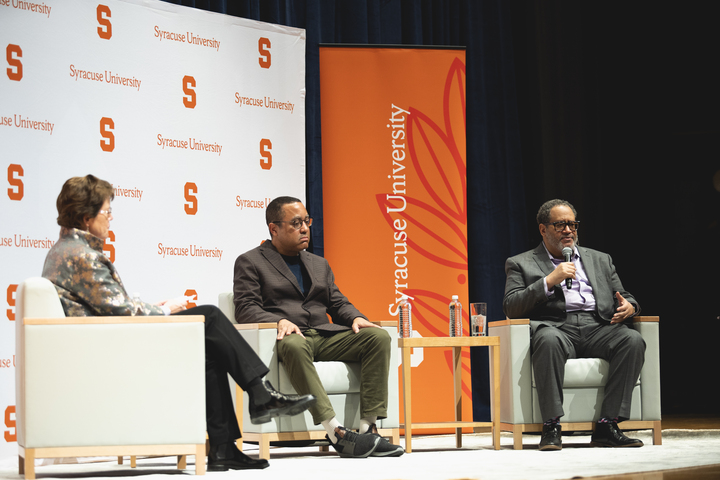Michael Eric Dyson and John McWhorter discuss fostering a healthy democracy
Michael Eric Dyson and John McWhorter discuss fostering a healthy democracy

Michael Eric Dyson and John McWhorter, both professors, prominent media personalities and authors, joined Vice Chancellor and Provost Gretchen Ritter for a lecture on democracy in a time of steep political polarization. In their conversation titled Fostering a Diverse and Healthy Democracy in a Period of Polarization, the two discussed their views on the education system, social media and each other.
To begin, Ritter asked the two whether they believe that there has been a decline in conversations between people with differing political beliefs, and why that may be occurring.
McWhorter’s response focused on the role social media has played in inflaming tensions. He said that by 2012, many were active on social media and had their views reinforced by algorithms that only fed users content with which they agreed. This made it difficult for people to be open to conversations with others that have different views.
Dyson responded by agreeing with McWhorter about the danger of algorithms and added that he believes that talking to a person with different political views is “an occasion to engage another human being.” He said that social media algorithms create echo chambers and that democracy is at stake unless we are willing to engage with one another.
Ritter then asked about the two and their relationship to one another, and more specifically, how they are able to engage and model dialogue despite not seeing eye to eye on anything.
“You have to see the humanity of your opponent, your friend, your colleague, your partner in conversation,” said Dyson. “You have to also acknowledge that you’ve got something to learn and have a little humility.” He said that our ideals are shaped toward a common goal, which is to arrive at an American society where there is genuine tolerance for differences, and we must remember that.
McWhorter’s response was that many of us know the same facts, but don’t see the issues the same way. “We must resist the impulse to say that … the person is no good,” said McWhorter.
The two both commended one another on their books and writings and agreed that they respected each other and their work.
Ritter then followed by asking the pair their opinions on how children should be taught about the United States regarding race and racism.
McWhorter took charge in responding to this question by saying that teaching this history is about balance. Methods that lean on one extreme or the other, like a “Dick and Jane approach” and “America has gone wrong as often as it has gone right” approach, are primitive ways to teach history. He believes that while Critical Race Theory is not being taught in schools, a “CRT-derived kind of thinking … is certainly being taught to my children and … it’s really a shame [because] it’s not teaching them reality.”
Dyson responded that the concern should be on policies like the Anti-Woke bill, put into place by Florida Governor Ron DeSantis.
“When Gov. DeSantis signed this bill, he said that he did not want the children to feel uncomfortable, but you have to depend on a certain level of discomfort in order to have true pedagogy,” Dyson said. “If you ain’t uncomfortable with your ignorance, you ain’t gonna learn nothing.” He argues that CRT is an overblown issue and that we should excavate the past through history classes.
Following the event, two staff members shared their reason for attending the conversation. Eboni Britt and Armando Martinez, both from the Office of Diversity and Inclusion, were pleased with the experience. They expressed the sentiment that as people who work in Diversity, Equity, Inclusion and Accessibility, they must be able to have conversations with all kinds of people.
“It is critically important to understand how to talk to people with different beliefs to truly embody DEIA,” Britt said.
“Our goal is education,” Martinez added. “And we get there by listening and understanding people on all sides.”





